October 20, 2016
by Carole Zangari -

Shared book reading is a great way to get families involved in building language and AAC skills. Today we’re back with another AT Recipe for Success from SLP Sara Barnhill and the AT Team at Children’s Hospital of Richmond at VCU. They’ve created several extension activities based on the book, Sometimes I Feel Sunny, to help families have fun and build AAC skills at the same time. As a member of the AT Core team, Sara is involved in AAC evaluations and therapy in the hospital’s clinics, out-patient program and Transitional Care Unit. CHoR’s AT Program is one of few comprehensive AT programs in Central Virginia. Their program provides AT evaluations, equipment and training to people of all ages, enabling children and adults with disabilities to function more independently. CHoR’s AT team consists of four SLPs, two OTs, one PT, and one Therapy Practice Assistant. In addition to completing transdiciplinary evaluations and treatments, CHoR’s AT team is... [Read More...]
Filed under: Featured Posts, PrAACtical Thinking
October 18, 2016
by Carole Zangari -

Tuesdays are the day when we try to spend a little time learning more about an SGD or AAC app. Today, we’re looking at Saltillo’s Chat Fusion. Come learn along with us! Product Information User Manual Video Tutorial on Headpointing Video Tutorials on Chat Software Quick Start Guide Where To Go For Help Live Chat eTicket Phone: 1-800-382-8622 (Spanish: 1-800-262-1984 ext. 1417) Email: service@saltillo.com (Spanish: espanol@prentrom.com) Happy exploring!
Filed under: Featured Posts, PrAACtical Thinking
Tagged With: Teach Me Tuesday
October 14, 2016
by Carole Zangari -

One of the best ways to enhance our teaching is to understand and respect the things that motivate our learners. We are all motivated by different things, though, and sometimes it can be hard to figure out the specifics of what a particular learner likes well enough for it to be used as reinforcement. Sometimes it’s easy. We all know kids who would do anything for [iPad time; Thomas the Tank Engine, Super Why, Pokemon, Hello Kitty] or [you fill in the blank]. We can use those in formal and informal ways to keep these learners motivated and engaged. And that’s important because, often, what we are asking them to do is hard. But sometimes, we work with people for whom those ‘magic motivators’ aren’t so clear. The ‘typical’ reinforcers don’t seem to work for those folks, and that can slow down progress. How can we figure out what motivates... [Read More...]
Filed under: Featured Posts, PrAACtical Thinking
Tagged With: forms, preferences, reinforcement, teaching
October 10, 2016
by Carole Zangari -
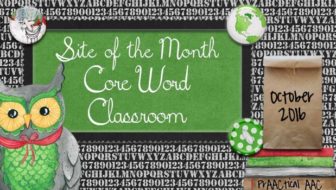
Looking for materials that you can use to support AAC in educational settings? AssistiveWare’s newest venture, The Core Word Classroom, may be just what you are looking for. While the materials align with their AAC app Proloquo2Go, the concepts, activity ideas, and planning tools have broad applicability. Jennifer Marden and Amanda Hartmann, who created most of the content for this new venture, introduce us to the site. :::::::::::::::::::::::::::::::::::::::::::::::::::::: The AssistiveWare Core Word Classroom is a resource for anyone who is implementing a core word-based AAC system. The materials focus on teaching using core words, as well as expanding communication beyond requesting to all the reasons we communicate, and helping AAC users use the full grammatical possibilities of language. The classroom materials are built around a framework called the 3W’s: WORDS – the core words that could be used for an activity WHYS – the many different reasons why we communicate... [Read More...]
Filed under: Featured Posts, PrAACtical Thinking
Tagged With: classroom, core vocabulary, resources, school
October 6, 2016
by Carole Zangari -
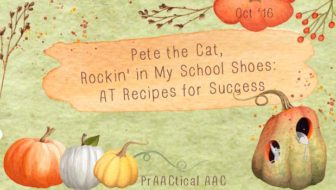
It’s time for another AT Recipe for Success with SLP Sara Barnhill and the AT Team at Children’s Hospital of Richmond at VCU. Today, we’re learning how they use extension activities based on the book, Pete the Cat Rockin’ in My School Shoes, to help families have fun and build AAC skills at the same time. Sara and her colleagues have been incredibly generous in sharing their work over the past several months. If you missed them over the the past few months, you can view previous posts here. Each one has parent handouts for you to download. As a member of the AT Core team, Sara is involved in AAC evaluations and therapy in the hospital’s clinics, out-patient program and Transitional Care Unit. CHoR’s AT Program is one of few comprehensive AT programs in Central Virginia. The program provides AT evaluations, equipment and training to people of all ages, enabling children and adults with disabilities to... [Read More...]
Filed under: Featured Posts, PrAACtical Thinking
Tagged With: download, family, home, parent
October 5, 2016
by Carole Zangari -
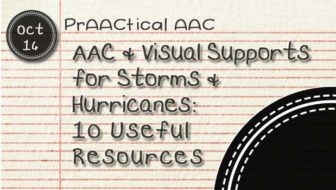
With Hurricane Matthew bearing down on us, we began thinking about ways to support people with significant communication challenges. Here are a few resources that you might find helpful. Hurricane Matthew is Coming! by UCF CARD It is Hurricane Season by Autism Educators Hurricane Preparation by Mary Grace Hektner via Boardmaker Online (need Boardmaker to use) What Is A Hurricane? by Mary Grace Hektner via Boardmaker Online (need Boardmaker to use) Tornado Vocabulary by Mary Grace Hektner via Boardmaker Online (need Boardmaker to use) Storm Social Narrative by Sandy K via Boardmaker Online (need Boardmaker to use) Making a Thunder Box from the Practially Speeching blog Webinar on Disaster Preparedness for People with Complex Communication Needs by AAC RERC Emergency Preparedness for Children with Autism from the Preparedness Mama Emergency Communication Board by Temple University Institute on Disabilities English Spanish Haitian Creole Stay safe out there!
Filed under: Featured Posts, PrAACtical Thinking
Tagged With: visual supports
September 29, 2016
by Carole Zangari -
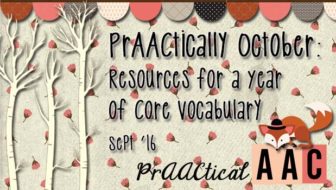
Know any AAC learners like these? Jeremiah has an SGD with thousands of core and fringe words, but he uses less than 100 of them in day-to-day life. Bella used an AAC app with visual scene displays to interact at playtime and during daily routines for the past several months. Her team just added an app with grid-based vocabulary so that she can begin to create novel sentences and expand her language abilities. Mason was recently evaluated for an AAC device, but it will likely take a few months to get the funding situation straightened out. In the meantime, his team created a manual communication board that mirrors the main screen of the SGD’s language software. Each of them need lots of practice to become fluent with the core words in their AAC systems. Are you looking for resources to support your use of core words in therapy, in the... [Read More...]
Filed under: Featured Posts, PrAACtical Thinking
Tagged With: core vocabulary, core words, downloads, resources
September 26, 2016
by Carole Zangari -
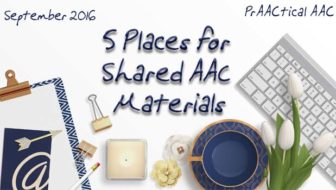
One of the most incredible things about the families and professionals who work in the field of AAC is their willingness to share the materials they create. In this post, we link to some of those wonderful sites where you can go to peruse and use AAC materials for communication, therapy, and classroom instruction. Kudos to all the companies and individuals who work so hard to make this collegiality possible! Speaking of Speech Materials Exchange (AAC) Lesson Pix Sharing Center Boardmaker Online CoughDrop Publicly-shared Boards Smarty Symbols Activity Library We’re just getting started and ready to expand this list in future posts. Do you have favorite places to go for sharing AAC materials? Let us know so we can continue to develop this list.
Filed under: Featured Posts, PrAACtical Thinking
Tagged With: download, resource, sharing
September 25, 2016
by Carole Zangari -
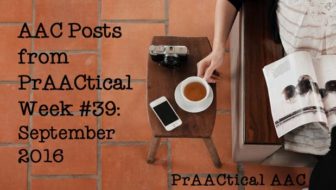
Meetings, therapy, assessments, paperwork, teaching, and more. It’s been a busy week for many of us. Here are some AAC posts you may have missed. Monday – Site of the Month: Project Core Tuesday – Teach Me Tuesday: Snap Scene and Pathways Thursday – PrAACtically Reading with Karen Natoci: Apples
Filed under: Featured Posts
Tagged With: summary post
September 22, 2016
by Carole Zangari -
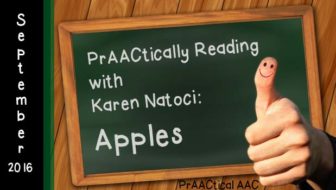
We are so happy to welcome back SLP Karen Natoci who graciously agreed to continue writing about how she uses interactive book reading to build language skills with beginning communicators. You can see her earlier posts in the PrAACtically Reading series here. In this post, she shares activity ideas for two books on apples. You can learn more about Karen and download her materials toward the bottom of the post. Enjoy! ::::::::::::::::::::::::::::::::::::::::::::::::::::::::: Books: Apples by Ken Robbins and Apples for Everyone by Jill Esbaum Adapted and simplified Powerpoint Book Apples by Karen Natoci Core Vocabulary focus: here, in, where Additional Vocabulary focus: Body parts; red, round, yellow, green, COMMUNICATION Matrix (Rowland, 2009) Level: I-VII (all levels!) ————————————————————————————————————————————- It is September and apple time! I chose to feature these books from which to adapt material suitable for students with complex communication needs. I have a simplified power point... [Read More...]
Filed under: Featured Posts, PrAACtical Thinking
Tagged With: classroom, implementation, literacy, reading









